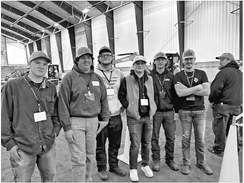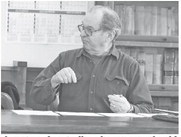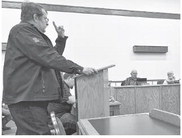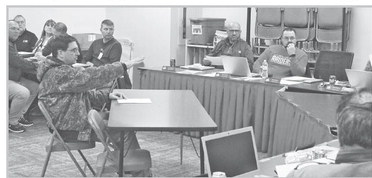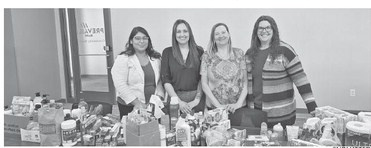JPS looking to future with educational partnership
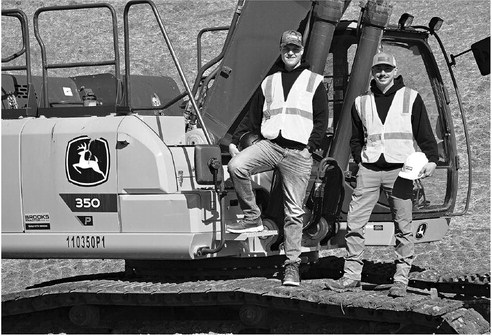

If you want to be a dentist the path to that goal is straightforward with academic programs that guide you to that profession.
The same holds true for doctors and lawyers and other jobs.
The path is less clear for those who choose careers in the trades, especially in heavy machinery operation.
Jeff Peterson, of James Peterson Sons, Inc (JPS), is working to change that.
Since 2021, the number of jobs in the highway, street, and bridge construction industry has increased by more than 38,300. According to the US Bureau of Labor Statistics (BLS), there are in excess of 375,000 people employed in keeping America’s infrastructure strong.
Even as the demand for these jobs continues to grow, the industry faces steep demographic challenges with the average age of workers in this industry at 47 years old, compared as reported by the BLS to the average general workforce age of 40 years old.
Peterson and JPS are taking an innovative approach of working with local schools and training programs to address the growing need for heavy equipment operators.
“People ask me, ‘How can I get my kid into your type of industry?’” Peterson said. Historically, there was really never anything set up to lead them into the field.
Peterson said he was approached by Rep. James Edming with a young man in Ladysmith who lived on a farm and was interested in road building. Peterson connected with the Highway Construction Skills Training (HCST) program with the Wisconsin Department of Transportation.
HCST is a six week intensive training program that prepares workers for careers in the road construction industry.
The challenge facing this young man was that there are only five places around the state where the program is offered — Hayward, Green Bay, Milwaukee, Racine and Madison — and the young man didn’t have a car or a way to get there.
With a growing push for young people to graduate from high school with skills to go into careers, Peterson felt there was more that could be done at the high school level to prepare students for these in-demand jobs.
He connected with Lorie Thompson of the Forward Service Corporation of Madison, which is one of the agencies offering the state training program, to see what could be developed to have this training within the high school curriculum.
As a former school board member, Peterson knew there was a desire, particularly at the Medford Area Public School District, for the school to be responsive to local industry needs. Peterson sat down with Laura Lundy, who is now the district administrator in Medford and at the time was the district’s curriculum director. Also involved were some of his staff members and Thompson.
They looked at areas where the training program requirements could mesh within existing state program requirements. He said they came up with a program that addresses professionalism, ethics and life management topics.
At Medford there is an opportunity for students to take “Zero Hour” classes before the start of the school day through a program with the Operating Engineers to learn maintenance, grading and surveying skills.
“We went down and checked all the boxes,” Peterson explained, noting that they have set up a program where high school students can earn the program credits needed to receive the certificate through Forward Services allowing them to go into the union programs for equipment operations.
JPS partnered with Medford Area Senior High School to allow students in the program to acquire what they need to be accepted into the HCST program by WisDOT and into the Local 139 Operating Engineers or Wisconsin Laborers’ District Council of LiUNA which is Local 113, Local 140, Local 268, Local 330, and Local 464.
Jenny Gowey of JPS explained that the process starts with students enrolling in Destination Career Academy Classes offered during zero hour during their Junior and Senior year enrollment (one class may be started sophomore year). These run from 7 – 8 a.m. Monday – Friday with Davey Sapinski and are in addition to regular classes and electives. There is no cost to the students for these additional classes. Students can often work at a pace they are comfortable with within the semester they are enrolled in the class.
Other required classes can be taken at anytime and are required for graduation from MASH with or without this program (Life Management, Health, Phy Ed, English 12, and Financial Literacy). Math of the Trades is a required math credit for this program.
In addition to their coursework during the year, every April the class takes a trip to Local 139’s Externship Day held at the Local 139 Training Center located in Coloma. The facility covers 380 acres for classroom and hands-on training. Students get hands-on learning with the ability to hop in an excavator and try their hand at it.
In addition, through the program, students earn certifications in OSHA 10 certification and CPR.
The program also offers an operators’ onsite mini course. Students sign up in the guidance office. This is held on a Saturday at JPS by either the JPS Safety Manager or a representative from the Local 139. It includes rigging exposure, flagging certification, crane signaling, personal budgeting and time management, job safety, and application information. They typically run this in March or April.
Students enrolling in the program are required to have ACT scores of Reading 15, Math 14 or Accuplacer scores of Reading 55 and Math 35 and pass their CDL written test after they turn 18.
Students then submit completed paperwork to the union of their choice to obtain their letter of eligibility.
The program offers major benefits to the students and families involved including: Free training – students will already have taken classes at no charge that others will have to take and pay for during their first/second years as an apprentice.
HCST graduates are more appealing to employers looking to hire operators and laborers.
The union offers 500 apprenticeship hours for completing the course.
Peterson said he also likes to get the students in the program to do work study job mentorship programs at JPS which gives them the opportunity to work in the shop and exposure to the equipment and machinery they will be using in their future career.
The program is able to give young people an important leg up on a potential career in the industry. He said they are able to get them certified as a flagger and then work on other certifications so that when they are 18 they can get their commercial drivers license (CDL) done.
“I get them way ahead of the game,” Peterson said of the training partnership.
Past graduates of the program agree. “The HCST program helped advance me through training courses in Coloma a bit faster. It gives you an edge on say a kid who doesn’t take the program. HCST will give you a step ahead in your operating career,” said Ben Brunner a 2022 graduate of Medford Area Senior High School and an apprentice with Local 139.
Fellow Medford graduate Connor Gowey agreed. “The HCST program helped me advance my knowledge going into the career of being an operator and getting hours toward my apprenticeship,” he said. Connor Gowey is a 2023 Medford graduate.
The young people benefit from being able to get into well paying jobs with good benefits right out of school. “They make good money and they get their winters off,” Peterson noted.
Peterson also noted that the road construction industry is getting more technologically advanced with GPS controlled equipment and lasers taking the place of string lines.
He explained there are already autonomous equipment in use and spoke of going to demonstrations where the person was sitting in one area controlling the equipment remotely. He said there may be a point where you can sit at home and run a bull dozer from there.
As with anything, this technology requires people to keep it maintained. Peterson noted that the construction industry is far from monolithic. “We have 20 different jobs within our own company,” he said of the diverse job opportunities for people.
